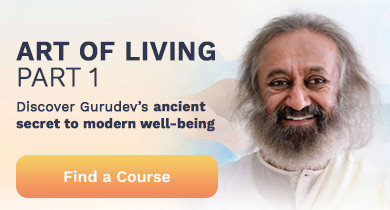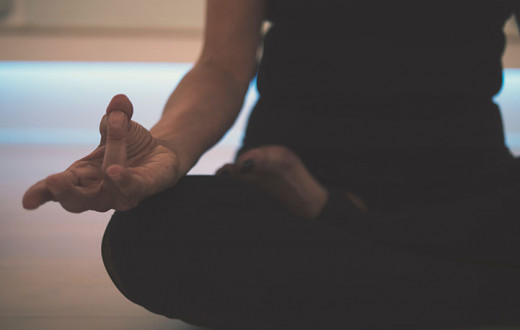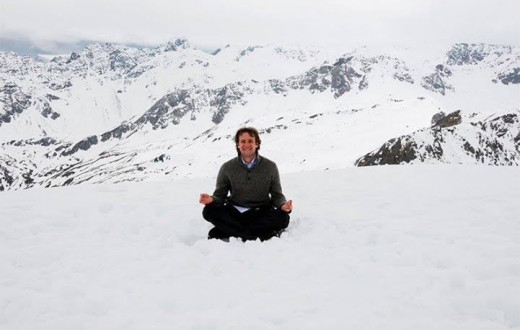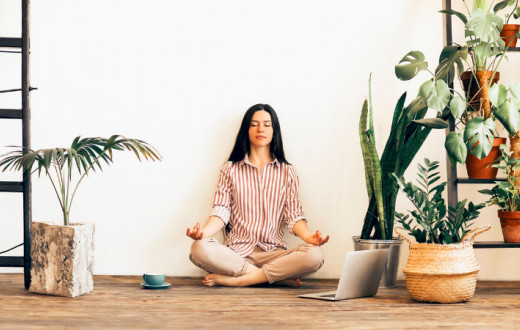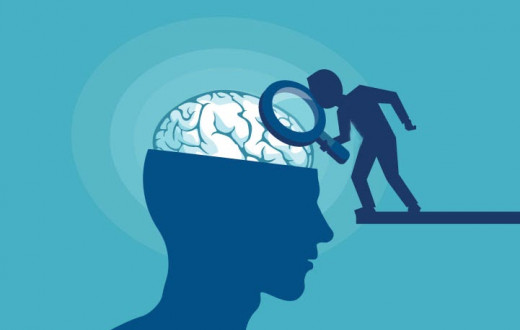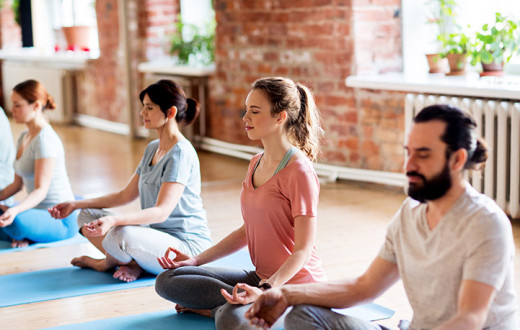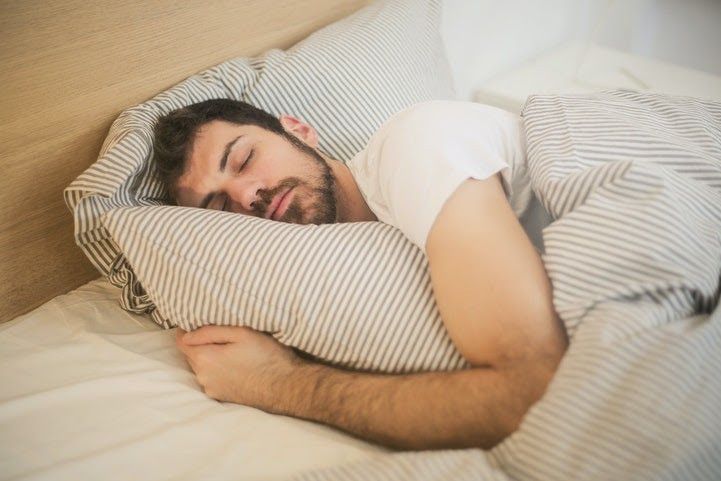
There may be many reasons why you are reading this article. Chances are that you are struggling with sleep issues. Maybe you find it hard to fall asleep or you are not satisfied with the quality of your sleep or you are sleep-deprived. Or maybe you are looking for aid like meditation to help you sleep better.
Meditation has improved my sleep in many ways. In this article, I will be discussing how a breathwork and meditation practice create the inner conditions needed for a truly restful night. Meditation can not only help to let go and fall asleep but also to get high-quality restful sleep.
Why your sleep matters
Sleep is an important state of rest and rejuvenation and a source of energy for the body and mind. Haven’t you noticed that when you are sleep-deprived you feel more tired, grouchy, irritable, and crazy?
Adequate sleep is very important: when you’re asleep your brain wave frequencies change, and neural firing decreases. Better sleep can lower stress and improve your memory, mental clarity, focus, immune system, and also reduce the risk of Alzheimer’s. Though healthy sleep has more to do with the quality of the rest, quantity also is important. Sometimes we might notice that our sleep patterns are disturbed for many reasons, some times wake up in the middle of the night and can’t fall back to sleep. We end up not getting enough sleep. This affects our memory, daytime activities, and productivity.
Insomnia and the alarming sleep statistical data
Insomnia—poor sleep or sleeplessness—is a sleep disorder that has many causes, including an overactive mind, stress, anxiety, depression, hormonal changes, chronic pain, sleep apnea, etc. Lack of sleep, in turn, can worsen these conditions, causing a depleting and vicious cycle of sleep deprivation and daytime fatigue.
A 2016 study by the Center For Disease Control and Prevention shows that 50 to 70 million adults display some form of sleeping disorder, with men reporting a higher rate of insomnia than women.
Studies and statistical data from the American Sleep Association say about 10-30 percent of adults have insomnia and difficulties with falling asleep and/or staying asleep. Around one-third of adults report typically getting less than 7 hours of sleep every night. Given the fact that adults need 7 to 9 hours of sleep to function best, it's not surprising that more and more people explore different sleep support techniques and sleep meditations are becoming most popular.
Meditation for sleep: how it works for improving your sleep
Achieving restful sleep can be hard especially if you are battling stress and anxiety—it can simply be hard to quiet your mind. Most of the issues around sleep begin with your overthinking processes at night. This is where meditation can help. When we settle the mind with meditation, it is easier to wind down, let go, and relax.

According to the Sleep Foundation, “If insomnia is at the root of your sleepless nights, it may be worth trying meditation. The deep relaxation technique has been shown to increase sleep time, improve sleep quality, and make it easier to fall (and stay) asleep.”
Meditation is the delicate and effortless art of doing nothing. It is the skill to take a deep rest while being conscious and alert.
There are many science-backed benefits of meditation including an increase in melatonin which improves the quality of sleep. Research on various meditation techniques like the SKY Breath Meditation, Mindfulness Meditation, and Vipassana meditation, have been shown to improve the quality and quantity of sleep, how quickly you fall asleep, and how long you can stay fresh and energetic during the day.
Independent research on SKY breath meditation indicates that SKY practitioners spent 13% of their total sleep time in a deeper restful SWS state (stages 3 & 4 sleep), whereas the control group spent only 4% time.
How SKY helps with aging-related sleep quality
Watch this video where Ronnie Newman, Director of Research, Art of Living Foundation explains how SKY Breath Meditation can help you relax and improve the quality of your sleep.
When we reach about 40 years of age or so, we actually spend less time in the deeper stages of sleep than those who are younger than us. Studies have found that with SKY Breath Meditation practice is that it seems to turn back the sleep clock, such that people who are in their forties begin to experience sleep as they did at a younger age. As a result, they have significantly more time in the deeper stages of sleep than their peers.
Can sleeping be meditating? Are 20 minutes of meditation equal to 4 hours of sleep?
These are some commonly asked questions.
Both meditation and sleep bring deep relaxation to you, that is why at some level they both seem similar but they are very different. Read here 7 interesting ways they both differ.
The quality of the rest that you get during meditation is definitely more profound. Therefore it is being said that the rest that you get during 20-30 minutes of meditation is almost like four hours of sleep. Over a period of a few years of regular meditation practice, you may require less sleep. But it is not at all advisable to drastically or intentionally cut down your sleep. If that happens naturally, let it happen.
How to meditate to sleep better?
1) Choose long-term vs quick fix
Changing the patterns and quality of sleep depends on the quality of your mind and your overall lifestyle, therefore it requires much more than doing a simple meditation in bed. So rather than using meditation as a quick fix or as a sleeping aid just before going to bed, I would recommend that you create a meditation routine to reap its immense benefits. This may prove to be a permanent solution to your sleeping problems. Regular meditation practice can improve the quality of your mind and thus the overall quality of life and thus the quality of your sleep too.
The Art of Living’s SKY Breath Meditation course, for example, isn’t designed to send you to sleep at the moment, but it is designed to change your relationship with sleep and your life. It uses a specific rhythm of the breath that brings harmony to all rhythms of nature including your body and mind’s rhythm. By getting rid of the deeply rooted stress and unresolved impressions, and training the mind in a specific way — day by day — you gradually create an inner environment conducive to a restful sleep at night. SKY practitioners have reported sound sleep and deep rest with just 1st session of it.
It’s recommended that SKY Breath Meditation be used in the morning or during the day for the 40 consecutive days as a trial, in addition to the single guided sleep meditation at bedtime as and when necessary. The 40-day challenge trains the mind for long-term, sustainable change that can transform your sleep and life for good.
2) Using guided sleep meditation as a quick sleep aid
Having said the above, if for some reason, you are not able to learn the SKY Breath Meditation in the near future, I would then encourage you to use any of the following guided sleep support meditation techniques:
Breathing exercises: This involves regulating your breath in a specific way. Our breath and mind are closely connected. So breathing techniques like ocean breathing can help you immensely in aiding better sleep.
Yoga Nidra or mindful body scanning: This yogic sleep technique can help you release stress from various parts of the body and gradually put you to good sleep. It can also be used as a power nap during the day. Lie down in your bed comfortably, make sure you keep the volume low, and adjust in such a way that it auto stops once finished.
Gratitude: The sleep-focused meditation technique like appreciation meditation and loving-kindness meditation, ask you to count on your blessings and be grateful. Reflecting on how much you accomplished during the day, can fill your heart with contentment. So instead of getting in your bed with lots of complaints in your mind, you meet your sleep in gratitude or saying prayers.
Silence and stillness: A narrator or guide may ask you to lie calmly in silence and still for up to a few minutes, providing very little guidance, as a way to let go after a long and busy day.
Reflecting on your day: Review your day, in detail, action-by-action. This can be a great way to distract your mind from the bombardment of thoughts. Reflecting on how much you accomplished during the day, can fill your heart with contentment. This is a great way to begin powering down and can also be done prior to breathing or body scanning meditation.
How to use guided sleep meditation and what to expect?
In simple terms, guided sleep meditation is intended to involve meditating before sleep, typically while you are laying in bed after your day. If you prefer, you can practice sleep meditation on your own but guided practice usually means that you listen to an audio recording that directs you through the steps of any of the guided sleep meditation listed above. You can use a nice meditation app like Journey App or Calm or any of your favorite apps. In addition to guided meditations, Journey App has some very useful sleep support content and is quite popular. Check it out with a limited-time free trial. If you’re practicing unguided meditation progress at your own pace.
Meditation for sleep should be approached the same way we approach any other meditation, gently, with a relaxed focus without trying to force sleep, otherwise, you may encourage more thoughts and maybe some tension. Allow yourself to be led by the guidance, not thinking too much about the technique or instructions, allow the body to relax, and allow the mind to drift off softly and gently.
Benefits of guided sleep meditation
The goal of guided meditation is to reduce the impact of worrying thoughts and tension on your body-mind complex and on your sleep and thus help you get deeper relaxation and rest. By learning how to let go and relax your body, you will start to notice improvements in your ability to fall and stay asleep.
Guided sleep meditation allows you to let go of the thoughts that are whirlpooling and thus to rest your mind. In turn, this activates your parasympathetic nervous system, which helps to lower your heart rate and slow down your breathing rate. All of these changes prepare you for sleep—you may even find yourself drifting off to sleep in the middle of the meditation practice. As getting enough sleep at night affects how you feel during the day, you will also notice daytime benefits of doing guided sleep practice like more energy, freshness, improved focus and concentration, and many more.
Why maintaining sleep hygiene is very important
A has been spoken about having proper sleep hygiene in recent years, and its crucial role to improve your sleep quality as well as to wake up easier. Below are some simple sleep hygiene practices that you can use in addition to guided sleep meditation:
Limit the use of blue-light devices in the last hour before bed, such as cell phones and computers. Say no to YouTube videos, games, social media, and Netflix movies at night. Unplug from music apps
If you like you can play some soft and relaxing instrumental music in your home in the evenings to start going into a relaxing mode
Avoid any caffeinated drinks after 3 or 4 pm
Keep your bed neat and clean
Follow your body’s circadian rhythm. Go to bed at the same time each night (ideally by 10 pm) and use your willpower to get up at the same time each morning (ideally by 6 am)
Maintain the a cooler temperature in your room for better sleep
Allow some fresh air to circulate in your room
Minimize sound in your bedroom (other than white noise)
Eat healthily and drink 6 to 8 glasses of water each day
Drink some warm milk with turmeric before bedtime.
Include regular exercise such as walking or yoga in your daily routine
Wear comfortable pajamas like cotton that are breathable
Write a gratitude journal or say your prayers before bed
Start with restful sleep today: take the first step now
We hope that you find this article useful. If you like to know more about the SKY Breath Meditation, or if you would like to have a taste of breathwork and guided meditation, I recommend you join our FREE online session with a live instructor.
Enjoy your Zzzz’s! Wish you a restful sleep tonight and every night!
Disclaimer: This content on the Art of Living Blog is not intended to be a substitute for professional medical advice, diagnosis or treatment. Always seek the advice of your physician or other qualified health providers with any questions you may have regarding a medical condition. Any links to third-party websites are provided as a convenience only and the Art of Living Blog is not responsible for their content.


